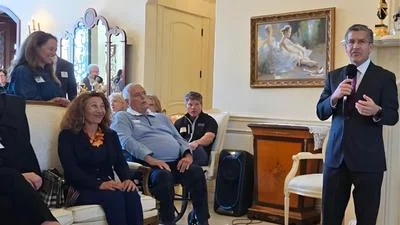Evanston residents attend a recent Town Hall meeting. | City of Evanston Illinois Government/Facebook
Evanston residents attend a recent Town Hall meeting. | City of Evanston Illinois Government/Facebook
Representatives from Baker Tilly presented the findings of the City of Evanston's pay scale evaluation to the Evanston City Council during a Sept. 12 meeting.
The firm began with extensive data analysis, including job descriptions and performance statistics, as well as pay scales and employee survey responses on what responsibilities they execute in their roles. In addition, they conducted a position appraisal of every employee, compared it to the general market and used the data to establish a payment structure or compensation philosophy.
"So if you think of your pay plan as like a map, the pay policies are the instructions for that map," Jada Kent, Baker Tilly senior manager, said in the meeting. "We just changed your map so you need to kind of tweak some of those pay policies and we've worked with the City to come up with those; so we urge to adopt those to keep the pay plan, meeting that compensation philosophy.
"But then this last recommendation is probably my biggest one, and it's to continue efforts like this, doing this class and comp study to kind of get things recalibrated, continue to review the market, making adjustments, and then merit increases to move employees through that range."
Baker Tilly suggested that the City embrace proposed adjustments to job titles and descriptions, as well as identify a means to execute the proposed compensation plan.
The new pay plan was developed for the City based on duties, market values, and an acceptable spread and growth for employment levels and skills.
The firm stated that 69 of the City's 762 existing workers currently earn less than the proposed minimum, while 676 earn within the suggested range and 17 earn more than the proposed maximum.
Fourteen distinct localities were identified as being equal to or competitive with Evanston, suggesting a minimum of four matches per benchmark (or typical position) as well as a 75% overlap of tasks in each of those matches.
Data was obtained and utilized from all 14 municipalities in Illinois, including Aurora Heights, Arlington, Buffalo Grove, Chicago, Glenview, Highland Park, Lake Forest, Lincolnwood, Naperville, Northbrook, Oak Park, Schaumburg, Skokie and Wilmette.






 Alerts Sign-up
Alerts Sign-up